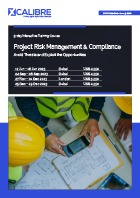| Date | Venue | Fee | |
|---|---|---|---|
| 16 Mar - 20 Mar 2026 | Dubai – UAE | $ 5,950 | Register Now |
| 08 Jun - 12 Jun 2026 | Dubai – UAE | $ 5,950 | Register Now |
| 31 Aug - 04 Sep 2026 | Dubai – UAE | $ 5,950 | Register Now |
| 23 Nov - 27 Nov 2026 | London - UK | $ 5,950 | Register Now |
| 21 Dec - 25 Dec 2026 | Dubai – UAE | $ 5,950 | Register Now |
| 25 Jan - 29 Jan 2027 | Sharm El Sheikh - Egypt | $ 5,950 | Register Now |
About the Course
Risk is inherent in everything we do, and it's no surprise that risk management holds high importance within the business environment. Risk management is not an optional activity; it is essential to successful business management. Some organisations manage risk better than others. Project results show that risk management is crucial for successful outcomes. How do organisations accomplish this? What are the best practices in risk management that are needed to succeed in today's changing environment?
Risk management is handling uncertain future events that may affect the projects and the operation of the organisation to minimise the negative impact and enhance the positive effect.
This Project Risk Management & Compliance training course will discuss and illustrate the concepts and principles of risk management and how to manage the risks at the project, program, and portfolio level. It will define risk processes and identify how organisations are put these into practice to maximise project success. The course will illustrate the lessons learned and tools used in risk planning, identification, analysis, mitigation and control, providing the delegates with the required knowledge, skills and tools and techniques to successfully implement the risk concepts in their project, program and portfolio.
Core Objectives
The delegates will achieve the following objectives:
- Define the basic concepts and definitions related to project risk management
- Explain the five domains of project risk management
- Apply and use different tools and techniques to develop the risk management plan
- Analyse and differentiate between various tools and techniques to identify, analyse, and control the project risks
- Design the most suitable risk response plan
Training Approach
This training course will contain an interactive discussion and case studies and highlight the techniques available to the delegates, which includes different techniques such as pre and post-exams to assess the delegates' knowledge and to be familiar with the exam questions, and to know the real-world example to illustrate the concept and principles. Exercises to implement the learned concepts, Interactive discussion to enable information and knowledge sharing between the participants, and group activities to implement different tools and techniques.
The Attendees
Likewise, it will be valuable to the professionals but not limited to the following:
- Project Managers
- Project Teams
- IT Managers and Teams
- Risk Management Team
- Operations Managers
- Department Heads (Sales, Marketing, Finance, etc.)
- Anyone interested in Risk Management
Daily Discussion
DAY ONE: INTRODUCTION AND KEY CONCEPTS
- Risk Key Concepts and Principles
- Project, Program and Portfolio Risks
- Risk Framework and Context
- Business Context
- Organisational Framework
- Risk Accountability
- Risk Lifecycle
DAY TWO: RISK PLANNING AND RISK IDENTIFICATION
- Project Stakeholder
- Risk Plan
- Communication
- Leadership
- Motivational Theories
- Risk Identification
- Tools and Techniques
- Risk Register
DAY THREE: QUALITATIVE AND QUANTITATIVE RISK ANALYSIS
- Types of Analysis
- Qualitative Risk Analysis
- Quantitative Risk Analysis
- Probability Analysis
- Decision Tree
- Expected Monetary Value
- PERT Analysis
DAY FOUR: RISK RESPONSE PLANNING AND IMPLEMENTATION
- What is response strategy?
- Types of Response Strategies
- Positive Risk Strategies
- Negative Risk Strategies
- Risk Response Implementation
DAY FIVE: MONITORING AND CONTROLLING RISKS
- Difference between Monitoring and Controlling
- Risk Monitoring
- Risk Controlling
- Risk Closing
- Risk Response Evaluation
- Risk Documentation
Certificate Awarded
Upon successful completion of this training course, participants will be awarded a Certificate of Completion from XCalibre Training Centre, acknowledging their accomplishment. This certificate serves as a testament to their dedication to developing their skills and advancing their expertise in their respective fields.



